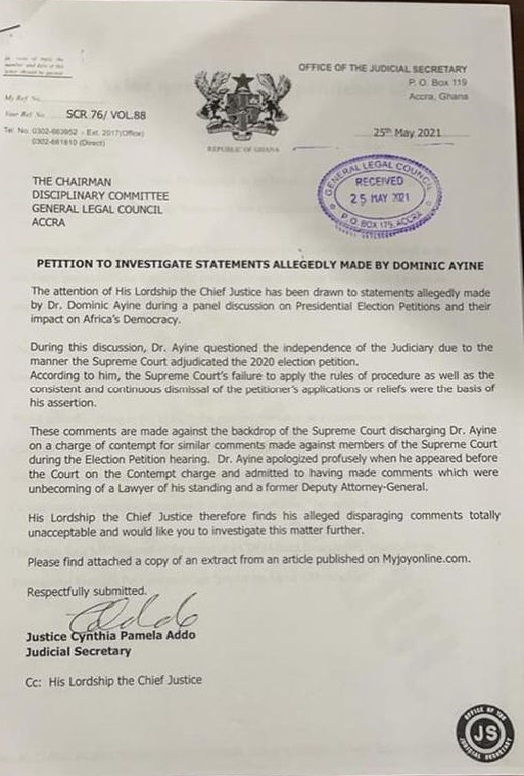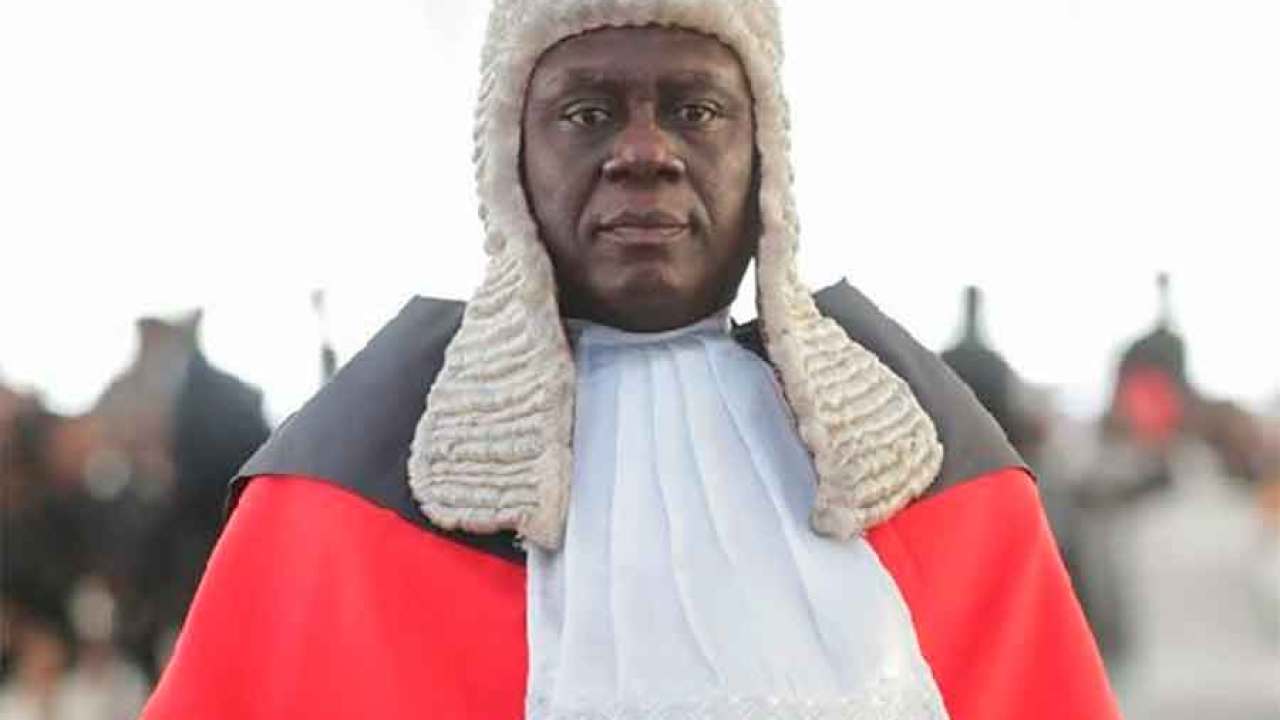The Chief Justice, Kwesi Anin Yeboah, has petitioned the Disciplinary Committee of the General Legal Council (GLC) to investigate alleged disapproving comments made by former Deputy Attorney-General, Dominic Ayine, about the Judiciary.
According to the petition to the regulator of the law profession in Ghana sighted by Prime News and dated May 25, 2021, Mr Ayine’s comments sought to question the independence of the Judiciary because of the manner the Supreme Court decided the 2020 Election Petition.
“According to him, the Supreme Court’s failure to apply the rules of procedure as well as the consistent and continuous dismissal of the petitioner’s applications or reliefs were the basis of his assertion.
“These comments are made against the backdrop of the Supreme Court discharging Dr Ayine on a charge of contempt for similar comments made against members of the Supreme Court during the Election Petition hearing. Dr Ayine apologised profusely when he appeared before the Court on the Contempt charge and admitted to having made comments which were unbecoming of a lawyer of his standing and a former Deputy Attorney-General.
“His Lordship the Chief Justice therefore finds these alleged disparaging comments totally unacceptable and would like to investigate this matter further,†parts of the petition read.
Read the petition to the General Legal Council below.

 Meanwhile, the Executive Director of the Ghana Center for Democratic Development (CDD-Ghana), the governance think tank that organised the seminar where Dr Ayine is alleged to have made the disparaging comments, says the petition to probe the matter is unfortunate.
Prof Henry Kwesi Prempeh said in a social media post that Dr Ayine only expressed his personal opinion, albeit unflattering, on the Judiciary on an academic or civil society platform.
“On the same platform where this lawyer expressed the opinion that has earned him an invitation to appear before the Disciplinary Committee of the legal profession's regulator, other panelists, including other lawyers, strongly disagreed with him in his opinion of the judiciary regarding the case under discussion, with some praising the court's handling of the matter. In other words, the platform on which the lawyer spoke was a veritable marketplace of ideas and opinion, with panelists debating each other in frank, open dialogue,†he stated.
Below is Prof Prempeh’s full comment on the petition to the Disciplinary Committee of the GLC
So, now members of the Ghana Bar cannot offer a personal unflattering opinion of the judiciary on an academic, a civil society or other public discussion platfrom, even after a case has been decided, without risking being hauled before the Disciplinary Committee of the General Legal Council? Really?
On the same platform where this lawyer expressed the opinion that has earned him an invitation to appear before the Disciplinary Committee of the legal profession's regulator, other panelists, including other lawyers, strongly disagreed with him in his opinion of the judiciary regarding the case under discussion, with some praising the court's handling of the matter. In other words, the platform on which the lawyer spoke was a veritable marketplace of ideas and opinion, with panelists debating each other in frank, open dialogue.
This, incidentally, was a webinar discussion organized by CDD-Ghana, in collaboration with the KNUST law faculty, as part of a new "Judicial Review" series (a partnership between CDD and two law faculties in Ghana) that aims to review and examine decisions of the courts for their impact on democracy and good governance. This particular panel, which examined the recent Ghana election petition through a comparative lens, featured two foreign participants (from Kenya and Zimbabwe), four Ghanaian lawyers, and me.
That an opinion expressed at such a forum, to contestation from other participants, would cause anyone to lodge a formal complaint with the Disciplinary Committee of the General Legal Council is unprecedented, bizarre, and ill-advised. Not only is this bound to have a chilling effect on the free speech rights of lawyers, it will also impact negatively on both academic freedom and the freedom and ability of civil society to promote judicial accountability, including through projects like the Judicial Review series. I find no justification whatsoever for the Disciplinary Committee of the GLC to be brought into this matter or to investigate Dr. Dominic Akuritinga Ayine for the opinion he expressed on the panel. It cannot be ok for a lawyer to praise a court for its handling of a matter but an act of professional misconduct--or contempt of court--for another lawyer to express a contrary view of the same court about the same matter.





